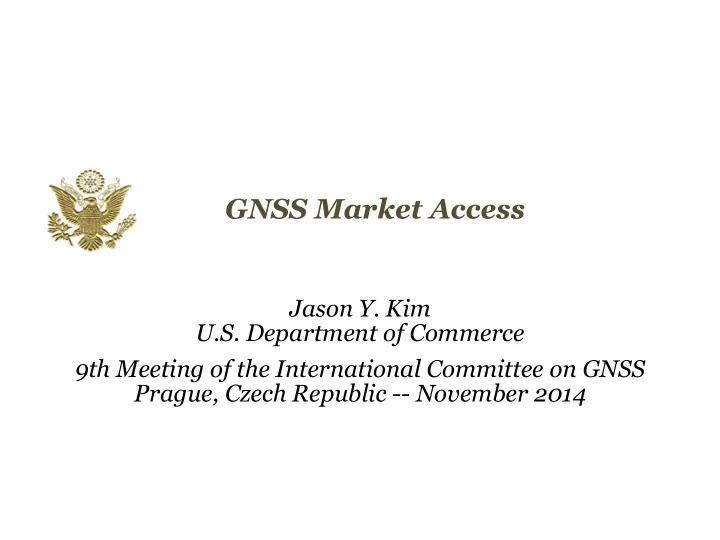

GNSS Market Access Jason Y. Kim U.S. Department of Commerce 9th Meeting of the International Committee on GNSS Prague, Czech Republic -- November 2014
U.S. National Space Policy The United States shall engage with foreign GNSS providers to: • Encourage compatibility and interoperability • Promote transparency in civil service provision • Enable market access for industry 2
Bilateral Efforts on Market Access • U.S.-Japan cooperation under 1998 Joint Statement – Identify potential barriers to the growth of commercial applications and appropriate preventative measures – Encourage trade and investment in equipment and services • U.S.-EU Agreement on GPS-Galileo Cooperation – Parties agree to consult before establishing GNSS standards, certification requirements, regulations, mandates – Parties affirm non-discriminatory approach with respect to GNSS trade – Working group established to consider non-discrimination and other trade related issues – Recognizes commitments under World Trade Organization (WTO) 3
WTO Commitments to Market Access • General Agreement on Tariffs and Trade (GATT) – Most Favored Nation (MFN) status for goods – National treatment for goods • General Agreement on Trade in Services (GATS) – MFN for all services – National treatment for scheduled services • Agreement on Technical Barriers to Trade (TBT) – No goods discrimination based on non-tariff measures (regulations, standards, testing, certification) • Agreement on Government Procurement (GPA) – Open, fair, and transparent conditions of competition in government procurement, as scheduled 4
U.S. Concern: Equipage Mandates • To promote adoption of their systems, GNSS providers are considering/implementing equipage mandates for various applications – Aviation – Motor carrier and HAZMAT vehicle tracking – Car accident reporting (eCall/ERA-GLONASS) – Emergency phone calls (E112) • U.S. recommends technology-neutral, performance-based standards – E.g.: E911 rules specify required accuracy and allow carriers to choose best technical solutions 5
Impact of GNSS Equipage Mandates on Market Access • Requiring specific systems arbitrarily prevents or penalizes imports of goods having perfectly functional GNSS capability – High-value products (airplanes, cars) and mass- market devices (mobile phones) • WTO members must comply with TBT obligations in setting technical regulations – GPA scheduled commitments also apply to 15 signatories 6
Problems with Equipage Mandate Compliance • Manufacturers & users seeking to comply with announced equipage mandates are confused – What qualifies as equipage -- carried onboard, installed, fully integrated, etc.? What minimum applications/ capabilities must be supported? – Who is responsible for identifying any required minimum capabilities? How to inspect, maintain, and recertify equipment to ensure it is working properly? – When will ICDs and performance commitments be available for new GNSS signals? When will new GNSS deployments reach a stable end-state signal configuration? – Do State mandates apply to foreign operators of vehicles transiting the State or only to domestically registered vehicles? • Clearer guidance needed to understand whether announced mandates comply with WTO rules 7
Recommendation U.S. requests that the ICG Providers’ Forum: • Add GNSS market access to its future agenda for discussion • Consider developing a new principle on market access for future adoption 8
Recommend
More recommend